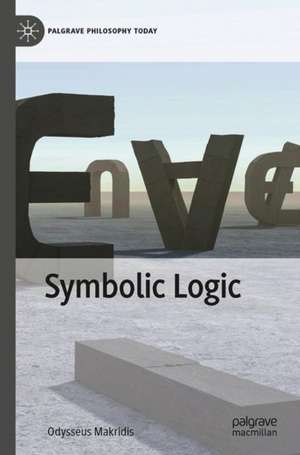Symbolic Logic: Palgrave Philosophy Today
Autor Odysseus Makridisen Limba Engleză Paperback – 22 feb 2022
· The characteristic nature and scope of logic as a discipline
· The construction of a series of distinctly named formal languages suitable for formal translation
· Semantic models
· The construction of decision procedures
· The execution of proof-theoretic arrangements like natural deduction and proof-sequent systems The book covers both the semantics and proof theory of the standard sentential (propositional) logic and predicate (first-order) logic. Other topics covered include: parsing trees,extraction of alternative notations (for instance, Polish notation), Fitch-style proof-theory, sequent and ‘tree’ proof systems, comparisons and contrasts with intuitionistic logic, and presentations of predicate logic models. An ancillary chapter on elements of set theory is conveniently placed at the end and includes insights into the Zermelo-Fraenkel systematization of set theory. The philosophy of logic is also explored.
Exercises in the text provide instruction on mathematical induction for the construction of formula, tests for the well-formedness of Polish notation, and functional completeness.
Symbolic Logic is essential reading for all philosophy students taking intermediate level formal logic courses and will also appeal to diligent first year students of logic. The text is replete with exercises on both the formal machinery and the philosophical aspects of logic.
Preț: 362.38 lei
Nou
Puncte Express: 544
Preț estimativ în valută:
69.34€ • 74.15$ • 57.82£
69.34€ • 74.15$ • 57.82£
Carte disponibilă
Livrare economică 28 martie-11 aprilie
Livrare express 13-19 martie pentru 45.73 lei
Preluare comenzi: 021 569.72.76
Specificații
ISBN-13: 9783030673956
ISBN-10: 3030673952
Pagini: 465
Ilustrații: V, 492 p. 2 illus.
Dimensiuni: 155 x 235 x 41 mm
Greutate: 0.69 kg
Ediția:1st ed. 2022
Editura: Springer International Publishing
Colecția Palgrave Macmillan
Seria Palgrave Philosophy Today
Locul publicării:Cham, Switzerland
ISBN-10: 3030673952
Pagini: 465
Ilustrații: V, 492 p. 2 illus.
Dimensiuni: 155 x 235 x 41 mm
Greutate: 0.69 kg
Ediția:1st ed. 2022
Editura: Springer International Publishing
Colecția Palgrave Macmillan
Seria Palgrave Philosophy Today
Locul publicării:Cham, Switzerland
Cuprins
1. What Logic Studies.- 2. Concepts of Deductive Reasoning.- 3. Formal Logic of Sentences, Sentential Logic (also called Sentential Logic and Statement Logic).- 4. Sentential Logic Languages ∑.- 5. Formal Predicate Logic (also called First-Order Logic) ∏.- 6. Translations from English into ∏πφ= (also called Symbolizations, Formalizations).- 7. Semantic Models for ∏: ∏⧉.- 8. Proof-Theoretical System for Predicate Logic: ∏πφ=.- 9. Definite Descriptions: ∏πφ=⍳.- 10. Basics of Set Theory.
Notă biografică
Odysseus Makridis is a Professor of Philosophy at Fairleigh Dickinson University, USA. Previously, he taught at Brandeis University, USA, and was Teaching Fellow at the Harvard Kennedy School of Government, USA.
Textul de pe ultima copertă
This book provides a comprehensive introduction to the essential elements of standard (classical) symbolic logic. Key topics covered include:
· The characteristic nature and scope of logic as a discipline
· The construction of a series of distinctly named formal languages suitable for formal translation
· Semantic models
· The construction of decision procedures
· The execution of proof-theoretic arrangements like natural deduction and proof-sequent systems
The book covers both the semantics and proof theory of the standard sentential (propositional) logic and predicate (first-order) logic. Other topics covered include: parsing trees, extraction of alternative notations (for instance, Polish notation), Fitch-style proof-theory, sequent and ‘tree’ proof systems, comparisons and contrasts with intuitionistic logic, and presentations of predicate logic models. An ancillary chapter on elements of set theory is conveniently placed at the end and includes insights into the Zermelo-Fraenkel systematization of set theory. The philosophy of logic is also explored.
Exercises in the text provide instruction on mathematical induction for the construction of formula, tests for the well-formedness of Polish notation, and functional completeness.
Symbolic Logic is essential reading for all philosophy students taking intermediate level formal logic courses and will also appeal to diligent first year students of logic. The text is replete with exercises on both the formal machinery and the philosophical aspects of logic.
· The characteristic nature and scope of logic as a discipline
· The construction of a series of distinctly named formal languages suitable for formal translation
· Semantic models
· The construction of decision procedures
· The execution of proof-theoretic arrangements like natural deduction and proof-sequent systems
The book covers both the semantics and proof theory of the standard sentential (propositional) logic and predicate (first-order) logic. Other topics covered include: parsing trees, extraction of alternative notations (for instance, Polish notation), Fitch-style proof-theory, sequent and ‘tree’ proof systems, comparisons and contrasts with intuitionistic logic, and presentations of predicate logic models. An ancillary chapter on elements of set theory is conveniently placed at the end and includes insights into the Zermelo-Fraenkel systematization of set theory. The philosophy of logic is also explored.
Exercises in the text provide instruction on mathematical induction for the construction of formula, tests for the well-formedness of Polish notation, and functional completeness.
Symbolic Logic is essential reading for all philosophy students taking intermediate level formal logic courses and will also appeal to diligent first year students of logic. The text is replete with exercises on both the formal machinery and the philosophical aspects of logic.
Caracteristici
Emphasizes the philosophical foundations of logicA learning-focused approach - the mode of presentation, and the numerous examples and exercises have all been developed with the key aim of assisting learningAstute use of recapitulation - reiteration is deployed deliberately with varying themes and accounts with the purpose of facilitating understanding and learning Broad coverage - topics included that other texts often omit (for example, intuitionistic logic and set theory)















